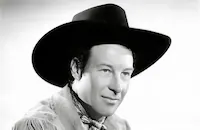Across the Sierras
Brief Synopsis
Cast & Crew
D. Ross Lederman
Bill Elliott
Richard Fiske
Luana Walters
Dub Taylor
Dick Curtis
Film Details
Technical Specs

Synopsis
After serving a six-year prison term, Mitch Carew, a cold-blooded murderer, returns to the town of Arroyo, thirsting for revenge on storekeeper Dan Woodworth and ex-marshal Wild Bill Hickok, the two men who put him in prison. At the Woodworth General Store, Mitch accuses Dan of framing him and then goads him into drawing his gun. No match for Mitch's skill with a pistol, the kindly old storekeeper is gunned down. Meanwhile, on the road to Arroyo, Bill sees a mob about to lynch a man for stealing cattle and goes to investigate. Discovering that the man about to be hung is his old friend cowboy Larry Armstrong, Bill insists that Larry be given a fair trial and takes him into custody. After riding a safe distance from the lynch mob, Bill tells Larry that he has come to Arroyo to stake out a homestead and invites his friend to join him. When Larry, embittered by the low wages being paid by the ranchers, refuses Bill's offer and advocates living outside the law instead, Bill becomes alarmed and insists that Larry accompany him to town. In Arroyo, meanwhile, Mitch has begun to organize a gang and instructs Stringer, one of his thugs, to acquire the Woodworth General Store as a front. Stringer is in the process of coercing Dan's widow into selling the store when his transaction is interrupted by Bill, who takes Stringer's money and sells him merchandise instead. After Bill shoves Stringer out the door, Mrs. Woodworth offers Bill and Larry a room and introduces them to Ann, her Eastern-bred niece. Charmed, Bill begins to court Ann, but she scoffs at his adherence to what she sees as the outmoded code of the West. When Bill discovers that Larry is planning to join Mitch's gang, Bill warns Mitch to leave Larry alone. Despite Bill's efforts, Larry joins the gang, and when Bill learns that his friend was involved in the robbery of the stage, he rides out after him. Mitch and the others hear that Bill is riding toward their camp, and hide in the rocks, while Larry waits for his friend at the campfire. Bill questions Larry about the robbery, but when Larry refuses to respond, Bill turns to leave. As he walks away, Stringer shoots at him, and Bill swings around and fires, hitting Larry. Realizing that he has shot his friend, Bill puts the wounded Larry on his horse and takes him to town. Although Larry forgives Bill with his dying breath, Bill blames himself for his friend's death and vows revenge on Mitch. Later, when Ann denounces Bill's sentiments, he offers to give up his guns if she will marry him. Meanwhile, at the gang's hideout, Mitch decides the time has come to kill Bill and rides into town. When Bill learns that Mitch is waiting for him, he straps on his guns and informs Ann that he must face down the outlaw to preserve his honor. In the saloon, an edgy Mitch waits for Bill, and accidentally wounds Cannonball, Bill's friend. Mitch then takes to the street in search of Bill, and when the two men come face to face, Bill shoots and kills the outlaw. Realizing that he will never be able to foresake the code of the West, Bill bids farewell to Ann and rides out of town.

Director

D. Ross Lederman
Cast

Bill Elliott
Richard Fiske

Luana Walters
Dub Taylor
Dick Curtis
Milt Kibbee
Leroy Mason
Ruth Robinson
John Dilson
Ralph Peters
Eddie Laughton
Carl Knowles
Tom London
Jim Pierce
Eddie Cobb
Art Mix
Ed Coxen
Crew

Film Details
Technical Specs

Quotes
Trivia
Notes
Following the opening title card, which lists the first three cast members of the film, credits on the viewed print were for a different picture. All other credits listed above were obtained from copyright and other contemporary sources. Credits on the viewed print May have been for the 1941 Columbia film The Return of Daniel Boone (see below). Although the Variety review lists LeRoy Mason's character as "Stanley" and Luana Walters' as "Alice," in the film they are called "Stringer" and "Ann" respectively. This picture was inspired by the real-life western folk hero Wild Bill Hickok (1837-1876), an Indian scout and lawman whose exploits made him famous throughout the West. He was shot dead while playing poker in Deadwood, South Dakota, holding a hand of aces and eights. The series does not accurately represent the historical facts of Hickok's life, however. For additional information about Hickok, please see the entry below for Wild Bill Hickok Rides.
Bill Elliott first appeared as "Wild Bill Hickok" in the 1938 Columbia serial The Great Adventures of Wild Bill Hickok, from which he adopted the sobriquet Wild Bill. In 1940, the studio decided to launch a series starring Elliott as "Wild Bill Hickok." The 1940 film Prairie Schooners (see AFI Catalog of Feature Films, 1931-40; F3.3522) inaugurated the series, which consisted of eight films and ended with the 1942 picture Prairie Gunsmoke (see below). All entries starred Elliott as Wild Bill Hickok and were produced by Leon Barhsa. In the first films, Dub Taylor played Bill's sidekick "Cannonball." Taylor was replaced by Frank Mitchell as Cannonball in the 1942 films Prairie Gunsmoke and The Devil's Trail. In the 1941 film King of Dodge City, Tex Ritter joined the ensemble. For additional information on the series, please consult the Series Index. Modern sources add Tex Cooper to the cast.












